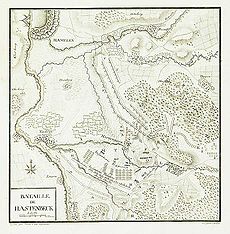| Invasion of Hanover | |||||||
|---|---|---|---|---|---|---|---|
| Part of European theater of the Seven Years' War | |||||||
 Battle of Hastenbeck | |||||||
| |||||||
| Belligerents | |||||||
|
| |||||||
| Commanders and leaders | |||||||
| Strength | |||||||
| Roughly 100,000 |
| ||||||
The Invasion of Hanover took place in 1757 during the Seven Years' War when a French army under Louis Charles César Le Tellier, duc d'Estrées advanced into the Electorate of Hanover and neighbouring German states, following the Battle of Hastenbeck. French forces overran most of Hanover. This action forced the Hanoverian Army of Observation, intended to defend the Electorate, to Stade on the North Sea coast. At the Convention of Klosterzeven the Duke of Cumberland agreed to disband his army and acknowledge the French occupation of the Electorate.
Following pressure by his British ministers, George II of Great Britain, Elector of Hanover, renounced the Convention and the German troops in his pay returned to active operations. By spring 1758 under a new commander, Ferdinand of Brunswick, the Allied forces had driven the French out of Hanover and pushed them back across the River Rhine. Germany remained a major battleground for the remainder of the war, with Ferdinand successfully repulsing further attacks on Hanover and its allies.